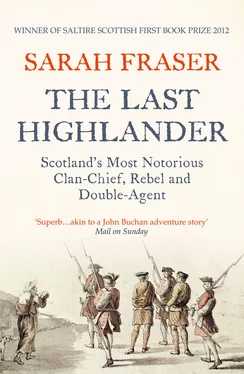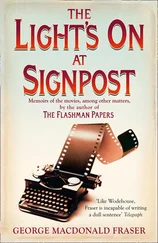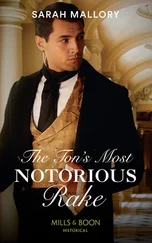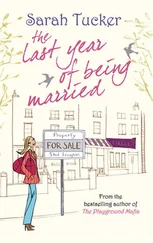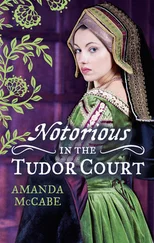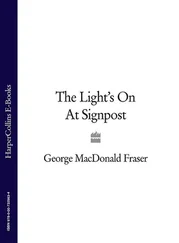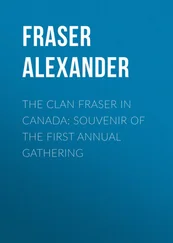Simon’s reaction was phrased in the clan rhetoric of pride and ‘face’: such ‘an affront was too atrocious … not to exact satisfaction for it, or perish in the attempt’, Simon later wrote. William of Errochit, a Stratherrick laird, shot forward and levelled a carabine at Saltoun and Mungo: ‘Stop, traitor, you shall pay with your hide your irruption into this country in hostility to our laird!’ The party skidded to a halt. Simon cantered up to Mungo Murray, yelling at him, ‘Fire traitor, or I will blow out your brains!’ Mungo dropped his reins and threw up his hands. ‘My dear Simon,’ he retorted. ‘Is this the termination of our long and tender friendship?’
Simon looked at him along his pistol. ‘You are a base coward, and deserve no quarter,’ he replied, ‘but I give you your life.’
Simon’s men moved among the group and disarmed them all, ‘without the smallest resistance from any individual’, except Lord Saltoun’s valet de chambre, who only gave up his weapon after Simon ‘struck him a blow on the head with the flat side of his sword’. The two Lords and their company of gentlemen were rounded up and taken to Fanellan, two miles from Castle Dounie, where Simon ordered the party to be locked up. A gallows was erected outside Lord Saltoun’s cell window. The unhappy noble sat alone in a tiny room and, in between the sawing and banging, listened to his fate being discussed. The door of Saltoun’s cell opened and another of Simon’s lairds, Major Fraser of Castleleathers, entered, swathed in plaid from top to toe, his face as red as his tartan. Taunting him, Castleleathers instructed his Lordship ‘to prepare himself for another world … He had but two days to live.’ The pro-Murray Frasers who had called Saltoun in to their country were then made to cast dice, ‘to know whose fate it was to hang with him’. This was ritualised violence, a tool in old-fashioned clan diplomacy; a display of seriousness of intent.
Lord Saltoun did not react well, Castleleathers recorded. As the effect of the news sank in, ‘the poor gentleman, finding this a hard pill to digest, contracted a bloody flux, of which he almost dyed’. Saltoun passed out cold, crashing to the floor. ‘Upon his recovery he begged his life, the gallows having stood all the time beneath his window – and 500 men waiting on in arms.’
Not wanting the death of a nobleman on his hands, Simon released them all immediately, though not before pressing his sword under Saltoun’s and Mungo Murray’s chins and making them swear never to come back to Fraser country. Happy to agree to anything, the nobles touched the tip of his weapon, swore the oath and fled.
The kidnapping had started out as what most Highland Scots recognised as a clan raid – a wild spree by the young bloods of one clan against another. However, the Murrays went to court to move the insult into quite another quarter. They declared the Frasers had risen in ‘open and manifest Rebellion’. This was a capital charge. The Murrays demanded legal endorsement – a ‘Commission of Fire and Sword’ – to send in soldiers to arrest the Beaufort Frasers and devastate their lands. The court had to distinguish between the private and public offence in all this. The government had an interest in rather than a monopoly on violence as a tool of justice in North Britain. Representatives of the Crown knew Tullibardine was trying to use Scottish law against a kindred he himself was provoking into a clan feud. The Privy Council in Edinburgh hesitated.
To Simon the kidnapping and high jinx was a Highland, private matter, between the Master of Lovat and the Murrays. He did not see himself as being in rebellion against the Crown. It might all have been diffused, had British justice not been even more vexed by what Simon did next.

FIVE
‘The Grand Fornicator of the Aird’, 1697–99
‘The Lady not yielding willingly, there was some harsh measures taken …’
– MAJOR FRASER OF CASTLELEATHERS
Simon did not stop to think. He did not know what would happen or leave enough time to scheme at every twist and turn. On 15 October, days after freeing Lord Saltoun, his Frasers galloped over the hill from Fanellan. Runners fanned out across the slopes around them, like the clan’s hunting dogs, and fell on Castle Dounie. Simon ordered a guard to be placed on all the avenues to the castle ‘to prevent the Dowager from sending to her father’, or brother. Simon made Lady Amelia pen a soothing note to Colonel Hill, the officer in charge of the government barracks at Fort William. ‘We are still in hopes to take away this riot friendly,’ she reassured him.
Meanwhile, the Sheriff of Inverness-shire did what was required to mollify the victims and rein in the aggressively exuberant Fraser youth. Simon and his associates would appear before him to answer for the kidnapping of Lords Saltoun and Murray. Simon travelled to Inverness, accompanied by his father, where he was rebuked by the Sheriff for letting things get out of hand, told to quieten down and dismissed. The Sheriff Court did not care to consider the issue of Simon’s occupation of Castle Dounie. Impatient heirs often bumped against a dowager trying to hang on in the old family home. Besides, Lady Amelia seemed cross, not terrified.
In Fort William, Colonel Hill relaxed. Brigadier Alexander Grant, the Sheriff of Inverness-shire, was a competent man and chief of Clan Grant, friends and neighbours of the Frasers for hundreds of years. Grant was a follower of the Earl of Argyll and ‘is judged competent for the Riot’, Colonel Hill assured Tullibardine. ‘I conclude there will be no more trouble about that affair,’ Hill said, turning his mind back to organising supplies. The campaigning season was drawing to an end, and his troops needed to winter in at the garrison.
Tullibardine threw Hill’s reply aside and composed a cold note. Hill should not act as if the feuding Frasers and Murrays were just two barbaric clans locked into a territorial dispute. ‘Not only on the public account, but also on mine,’ he said – as if Scotland and the Murrays were mirrors of each other. The colonel must use government troops to quell this ‘uprising against the King’. He must send a ‘strong party of the King’s soldiers amongst them … to apprehend the Beauforts … which,’ Tullibardine gritted his teeth, ‘I wish you had sent on the first account.’
At Dounie, Simon had thought of another way to settle the feud, as audacious as the first. If he could not have Amelia the daughter, he would have Amelia the mother. Then he would have both of them. He walked through to Lady Lovat’s chambers. She loved and esteemed him. They had known each other most of their lives. They must marry. Lady Lovat refused. ‘He urged the more, fearing that troops’ from the Atholl Murrays ‘would march against him’. Still she would not yield.
Simon considered for a moment, then shouted for a couple of men and despatched them to Inverness. They returned after dark. In their wake, they towed an inebriated Episcopal minister on a pony, the Reverend Robert Munro of Abertarff, a ‘poor, sordid fellow’.
‘The Lady not yielding willingly,’ Fraser of Castleleathers noted with foreboding, ‘there was some harsh measures taken, a parson sent for, and the bagpipe blown up.’ Too late, Lady Amelia realised how vulnerable she was. Two men hauled her, in tears, before Reverend Munro, Simon taking his position grim-faced by her side. The deafening groan of the pipes bounced off the walls of the small room. The minister kept his head down, and pronounced Amelia and Simon man and wife.
An overwrought Amelia was dismissed to her maids. Simon joined his men to drink the health of bride and groom, and the settlement of their troubles. The clan was safe. The Master of Lovat sent a man to Stratherrick to tell his father the news.
Читать дальше
